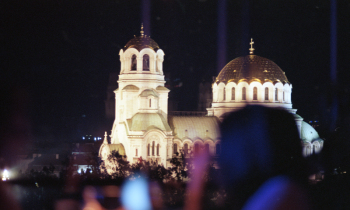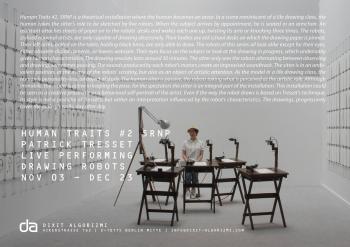Samstag, 10. Dezember 2016
Sofia by night
diegolego, 09:01h

Alexander Nevsky Cathedral
... link
Samstag, 3. Dezember 2016
Leila
diegolego, 09:28h
... link
Freitag, 18. November 2016
a ghost that the others can't see
diegolego, 16:21h
Agnes Obel - Familiar
... link
Mittwoch, 9. November 2016
no comment
diegolego, 12:48h
... link
Montag, 7. November 2016
I smell the garden in your hair ...
diegolego, 20:31h
Aus gegebenem Anlaß: "Marrakesh Express", das Video finde ich besonders gelungen.
... link
Dienstag, 1. November 2016
arXiv
diegolego, 16:04h
What Counts as Science? The arXiv preprint service is trying to answer an age-old question.
see also: arXiv
see also: arXiv
... link
Sonntag, 30. Oktober 2016
mehr paul
diegolego, 22:47h
LIVE Performance | Human Traits #2 by Patrick Tresset
3.11.2016 Dixit Algorizmi Gallery
Ackerstrasse 162, 10115 Berlin, Germany
"Human Traits #2, 5RNP is a theatrical installation where the human becomes an actor. In a scene reminiscent of a life drawing class, the human takes the sitter's role to be sketched by 5 robots. ..."
Nachtrag:

3.11.2016 Dixit Algorizmi Gallery
Ackerstrasse 162, 10115 Berlin, Germany
"Human Traits #2, 5RNP is a theatrical installation where the human becomes an actor. In a scene reminiscent of a life drawing class, the human takes the sitter's role to be sketched by 5 robots. ..."
Nachtrag:

... link
Freitag, 14. Oktober 2016
Computer & Graphics
diegolego, 09:36h
Ihr habt Euch sicherlich auch schon gefragt, wie funktioniert eigentlich Paul the robot drawing Patrick.
Hier wird das mal etwas wissenschaftlich dargelegt:
Portrait drawing by Paul the robot
Ich zitiere aus der Conclusion:
"Designing and building robot artists can serve a number of interesting and additional purposes, including: (i) providing new insights into the processes to put in place and their sequencing and interactions in greater similitude to human artists who have to consider when and how to interact with an artwork with their body, such as when evaluating the history and quality of the layout of lines already used in shaded areas; (ii) impacting the type of algorithms to consider and permitting to design specific mechanisms - such as various forms of feedback - which otherwise would likely remain unrecognised; (iii) orienting the form of perceptual mechanisms put in place, e.g. actions linked to schemata, such as drawing gestures in relation to camera/eye gazing; and (iv) enforcing proper line drawing actions where features (such as blob samples) are explicitly covered by strokes. This approach can also permit the field of computer graphics to have greater impact on the field of robotics itself."
Nachtrag: Ausstellung in Dixit Algorizmi Gallery, Eröffnung 3.11.2016.
Hier wird das mal etwas wissenschaftlich dargelegt:
Portrait drawing by Paul the robot
Ich zitiere aus der Conclusion:
"Designing and building robot artists can serve a number of interesting and additional purposes, including: (i) providing new insights into the processes to put in place and their sequencing and interactions in greater similitude to human artists who have to consider when and how to interact with an artwork with their body, such as when evaluating the history and quality of the layout of lines already used in shaded areas; (ii) impacting the type of algorithms to consider and permitting to design specific mechanisms - such as various forms of feedback - which otherwise would likely remain unrecognised; (iii) orienting the form of perceptual mechanisms put in place, e.g. actions linked to schemata, such as drawing gestures in relation to camera/eye gazing; and (iv) enforcing proper line drawing actions where features (such as blob samples) are explicitly covered by strokes. This approach can also permit the field of computer graphics to have greater impact on the field of robotics itself."
Nachtrag: Ausstellung in Dixit Algorizmi Gallery, Eröffnung 3.11.2016.
... link
Mittwoch, 5. Oktober 2016
NOFX book
diegolego, 10:57h
... link
Sonntag, 2. Oktober 2016
is nich egal
diegolego, 20:32h
... link
... nächste Seite